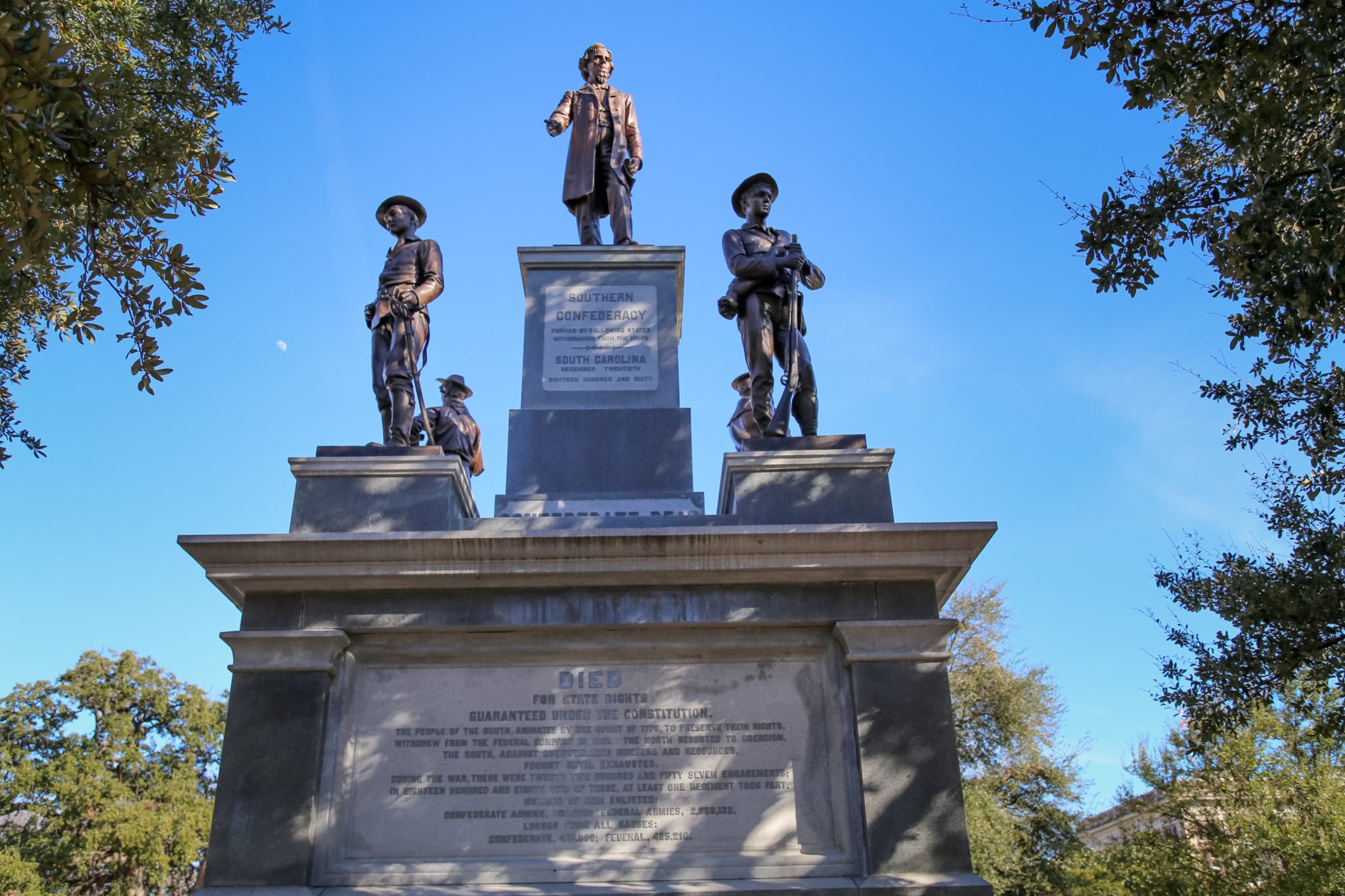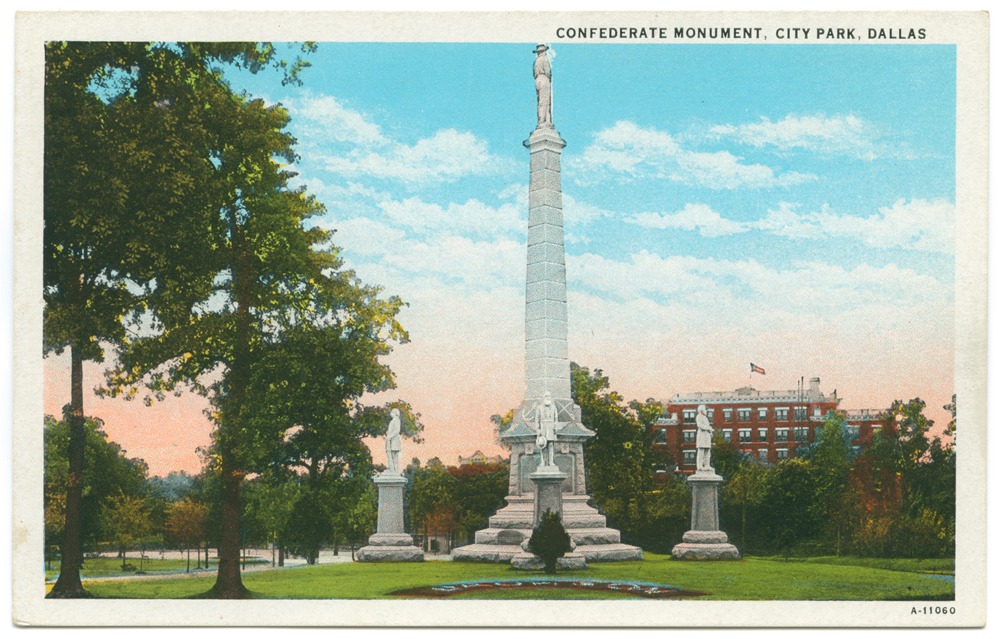
The Texas GOP’s War of Municipal Aggression
With their approval of a bill to “protect” Confederate monuments from liberal city halls, Senate Republicans exposed the raw racial dynamics of the party’s preemption crusade.

For more than a century, a pillar of granite and marble has loomed 60 feet high in downtown Dallas, topped with a statue of a Confederate soldier. Statues of four other rebel leaders encircle the monument. As of 2017, the memorial was just one of at least 180 symbols in the state honoring those who fought to preserve slavery — more than any other state, save the Confederacy’s home base in Virginia.
In recent years, activists have called on state and local politicians to remove these monuments, which they see as painful reminders that merely serve to glorify and legitimize the country’s racist past. “I’m a black man in America, and those Confederate statues are an affront to me and to my culture,” Kevin Felder, a Dallas City Council member, said in 2018. In February, the Dallas City Council voted to remove the infamous memorial, though it’s still not clear when that will happen.

More than 30 Confederate monuments were taken down in Texas between 2015 and 2018, according to a Southern Poverty Law Center report. This has sparked an intense backlash from Anglo conservatives who see the removal of these monuments as an erasure of their Antebellum heritage. Activist groups pumped out robocalls and radio ads calling on Texas Republicans to keep the monuments in place.
State lawmakers responded this session by proposing controversial legislation — Senate Bill 1663 and House Bill 3948 — to strip local governments of their authority to take down historical monuments, statues or portraits, or even rename schools, parks, streets and other public property.
Brandon Creighton, a Republican senator from suburban Houston who authored the upper-chamber version, brought the bill to the Senate floor Tuesday, prompting a heated and emotional debate. Houston Senator Borris Miles, one of the Senate’s two black members, called the legislation “disgraceful.”

“I ask that you consider some of the pain and heartache that we have to go through — myself and some of the brothers and sisters on this floor of color and what we’ve had to go through as it relates to our Texas history,” Miles said.
Creighton contended that SB 1663 is simply about historical preservation and education. “We need to educate, not celebrate, what [the Confederacy] stood for,” he said, adding that the measure is about “recognizing the good, the bad and the ugly of our past.” Creighton’s bill, as he explained it, would take the power to remove historic monuments from politically correct liberals in city halls and put it in the hands of local voters, who would need to approve any monument’s removal.
After hours of intense debate, an amended version of his monument protection bill passed out of the Senate along party lines. Creighton agreed to an amendment by Senator Kel Seliger, R-Amarillo, that would require local governing bodies to remove monuments with a supermajority, as opposed to voter approval.

It’s just another example of how Republicans are using their unprecedented control of state legislatures to dismantle political power in the country’s increasingly liberal cities. Creighton is at the center of that fight this session. He also authored a sweeping set of bills that would eviscerate municipalities’ power to set their own local labor standards, such as mandatory paid sick leave. Creighton insisted those measures are simply about protecting struggling small businesses and low-wage workers from those same overzealous city-hall liberals. That package passed out of the Senate and could soon get a House vote.
Texas isn’t alone. For years, red states have enacted laws prohibiting cities from establishing local minimum wages and other labor protections. In the face of renewed public opposition to Confederate monuments, several Southern states have passed laws making it extremely difficult to remove historical monuments.
Call it the “Monuments and Minimum Wages” doctrine. For state-level conservatives, preemption is about both consolidating economic power and preserving cultural power. But at its core, it boils down to one thing: maintaining political power. This multi-front attack on local control falls disproportionately on the shoulders of people of color in the South.
The blue dots in those red states — Atlanta, Birmingham, Charlotte, Jackson, Memphis, Dallas — have long served as epicenters for black political power. But the mostly white Republicans who control these states’ legislatures have systematically undercut the authority of democratically elected city leaders.
This multi-front attack on local control falls disproportionately on the shoulders of people of color in the South.
Take Birmingham, for example. Alabama’s largest city is majority black, as is its city council. When local activists first called for the removal of a 52-foot Confederate monument in 2015, Republican state legislators (most, if not all, of whom are white) rammed through a bill preventing cities from removing historical monuments. When that city council and the city’s black mayor passed an ordinance in 2016 raising Birmingham’s minimum wage to $10.10 an hour, the state legislature quickly rushed through a law preempting local minimum wages.
Now Texas Republicans want to follow suit.
Thanks to state preemption, the local government officials (many of whom are black and Latino) representing urban Texas are already woefully unequipped to mitigate the blowback from the state government’s embrace of radical austerity, rampant deregulation and culture warfare. City councils in Houston, Dallas, Austin, San Antonio and beyond are unable to raise pay for minimum-wage workers (most of whom are black and Latino) struggling to survive in these booming, expensive metropolises on the state-mandated $7.25 an hour. They could also soon be banned from mandating paid sick leave, water breaks or any other labor protection.
Now, Republicans want to make it more difficult for local officials to remove Confederate shrines. The House’s monument bill is still in committee, and it’s not clear if the chamber would take up the Senate version on the floor. But don’t expect conservatives to let up. Christopher Ekstrom is a Dallas Republican donor and head of the Conservative Response Team, a dark-money outfit that spends big money pressuring Republicans to “stop leftist cities from destroying monuments, renaming schools and airbrushing our past.”
“[Governor Abbott] needs to put up or shut up.” Ekstrom told the Dallas Morning News in December. “I’m going to hold him personally responsible if these monuments come down.”




